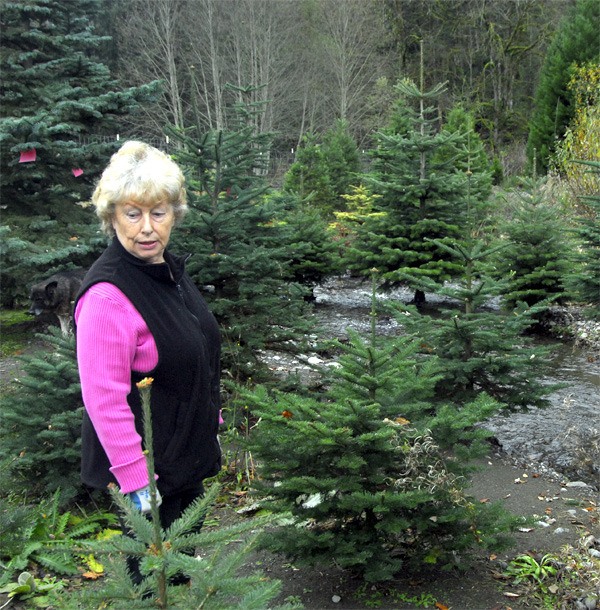The floodwaters that marred Mountain Creek Christmas Tree Farm are long gone. But the land, and the trees, still bear the signs.
Sand and rocks litter the grounds, small trees are dying, and the picturesque creek running through the property has left its bed in places, winding instead through the growing trees, under a fence, and onto a neighboring field.
Farm owner Marilyn Kassian toured one of the hardest-hit section of trees, and sighed, frustrated.
“If my son had time, he’d get rid of all of ’em, because he says it’s not very good-looking,” she said.
The 2010 crop is good, and the farm will open, as always, on the day after Thanksgiving. The Kassian family, who has run this North Bend farm for 30 years, are ready for the season. A busy holiday stretch will offset a miserable summer: Last June, floodwaters from a busted beaver dam upstream of deluged much of the farm. Scars from the flood are still evident.
Luckily for the Kassians, there wasn’t any real damage to the trees they expect to sell during this holiday season.
“We have plenty of trees for this year,” Kassian said. The family made use of some clearly damaged trees, using the limbs to make their richly varied wreaths and swags.
Kassian estimates they’ve lost 500 trees, but to know for sure, “We’ll have to wait until next year… we’ll have to wait and see.”
The family is also waiting for some type assistance from the state and county agencies from the Department of Fish and Wildlife to the Department of Development and Environmental Services (DDES) on cleaning up most of the debris from the flood.
“We do not get floods,” said Kassian, who’s owned the farm with her husband, Bill, since 1968. Naturally, they didn’t know what to do when the 60-acre Lake McLeod sent part of its contents gushing down the hill.
According to Jamie Hartley, an environmental scientist with DDES, they did the right thing by contacting his agency first.
“We can issue an emergency authorization to do some work that would normally require a permit first,” Hartley said. “The after-the-fact permit is still required,” he added, and property-owners have to apply for the permit within a specific time limit.
The Kassians were among several flooded property owners to get the emergency authorization in June, so they were permitted to clean off their small bridge over the stream and clear debris from the stream for about 20 feet in either direction. It definitely helped, Kassian said, but there is still a lot to do, especially to get ready for next year’s planting.
“This ground… used to be beautiful, black soil,” Kassian said, navigating through a rocky patch of trees. The family hauled in new soil each year to replenish the ground for new plantings. They’ll have to haul in a lot more next year, Kassian thinks, because “You can’t plant trees in a rock pile.”
The stream, and the fish in it, will be another big job. Kassian has talked with neighbors also going through the clean-up process, and she met with people from the state Department of Fish and Wildlife and multiple county agencies representing roads, wetlands, surface water divisions in October, and now she’s not certain if how, or even if she’ll be allowed to clean up the stream.
She’s also not sure how much it will cost her family to get the job done, which is a big concern.
“We’re a small business. We can’t afford thousands of dollars in costs,” she said.
So far, the agencies she’s met with haven’t been able to give her any definite answers about how or when the clean-up can begin, or how much it will cost.
“It’s very situation-driven,” said Hartley, explaining why they don’t have a good cost estimate. County fees will be changing in January, plus, the Kassians’ property may have special circumstances, requiring additional repairs to the bridge or shoring-up of the stream bed.
“This is not unusual at all that some mitigation needs to be done,” Hartley said.
The clean-up and the mitigation, though, will have to wait for the county agencies response, and for spring, when the creek is running lower and the holidays are over.
“We can’t do anything until June,” says Kassian, “We can’t do anything now, anyway, we’re busy.”
Mountain Creek Christmas Tree Farm is open daily from 9:30 to 5 p.m. To contact the farm, visit the website at www.mountaincreekchristmastreefarm.com.



